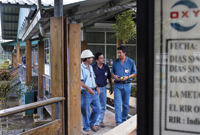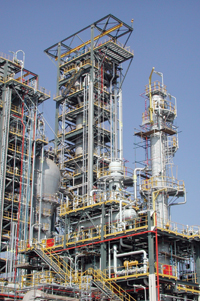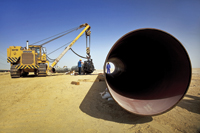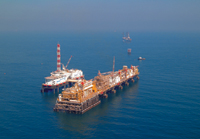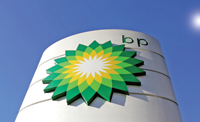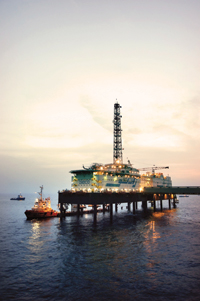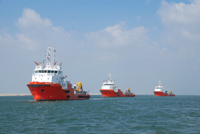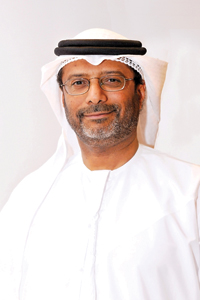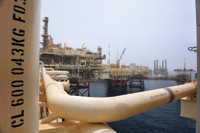
ABU DHABI National Energy Co (Taqa) has agreed the $1.058 billion acquisition of a package of UK central North Sea assets from UK-listed major BP – transforming Taqa’s profile in the basin.
With the roughly 21,000 barrels of oil equivalent per day (boepd) of production being transferred set to boost Taqa’s UK North Sea output from 42,900 boepd at end-2011 to around 60,000 boepd, Taqa claims it will now be “a leading operator” there.
The deal also adds 91 million boe in proven and probable (2P) reserves to Taqa’s current UK North Sea 2P reserve base of around 100 million boe – thus Taqa UK managing director Leo Koots says it will “double the size of the company [in the region] on a reserve basis.”
Set to complete in the first half of 2013, the acquisition will also firmly establish Taqa as a leading consolidator in the UK North Sea, according to Koots: “After 2013, we have positioned ourselves perfectly between the majors and the independents. If there is any divestment from the majors or independents, we can pick it up.”
Included in the asset sale are BP’s non-operated stakes in the Brae complex (27.7 per cent) and the Braemar field (52 per cent) as well as BP’s operating stakes in the Maclure (37.03 per cent), Harding (70 per cent) and Devenick (88.7 per cent) fields – the latter of which is a tie-in to Brae.
The split in 2P reserves transferred is around 60 per cent oil and 40 per cent gas, and dividing headline acquisition cost by the 91 million boe 2P figure yields a price-per-2P-boe multiple of around $11.60. As RBC analysts note, this is “at the low end of the range of deals completed by BP in the upstream, and compares for example with $13.90/boe for Alba and Britannia (to Mitsui, July 2012) and $14.90/boe for Wytch Farm (to Perenco, May 2011)”. RBC also notes however that this relatively lower multiple probably “reflects the costs of abandonment on the mature fields, which we estimate as two-thirds of the total reserves.”
As well as what looks a competitive price, Taqa has also obtained more than BP was originally willing to part with in this package, touted at first as essentially the Brae/Braemar assets. “The Brae infrastructure is fairly mature and it was an obvious one to offload, and with that we included Devenick, which is a tie-in into the Brae platform.
Harding was a difficult decision. We have been looking at it for a long time,” comments a BP source, “But Harding is slightly isolated. Developing gas reserves is expensive, and with our other reserves we felt it was one too many.”
As this source concludes, bundling the assets beyond Brae/Braemar into the deal for Taqa “made it more attractive to them.” Koots meanwhile tells EIF: “For us it is important that Harding is part of the package. For BP and ourselves it was a good deal. In the next 5-10 years we intend to change Harding over from oil to gas. We will change the field into a gas blow-down to produce the oil reservoir’s gas cap. That is the aspiration, but it depends on our partners. BP saw further development in Harding, but given Taqa’s size we are in a better position to develop these assets.”
While sweetening the transaction in asset terms, BP has however clawed back some upside through a revenue-sharing agreement on the Devenick gas development which will see the vendor enjoy 71 per cent of the future anticipated cash flow from Taqa’s assumed 88.7 per cent stake. Dependent on production and price environment, these future cash transfers back to BP could top $250 million.
While it takes BP up to $37 billion of agreed divestments against its stated post-Macondo divestment program target of $38 billion, the company source claims this disposal “does not make a dent on our North Sea reserve base” – and with BP now focusing on a handful of big North Sea fields across both the UK and Norway (some seven such development hubs going forward), at least one more UK North Sea divestment will follow. BP plans to sell its Sean field complex to what the source says is “a biggish utility,” with the deal for this gassy asset “a few weeks away” from being clinched.
Whoever purchases Sean, a feature of the UK North Sea sector in recent years has been the emergence of such utility-type players as material producers in their own right. Leading UK gas and power retailer Centrica has figured significantly, having most recently acquired from Total a package of nonoperated license stakes adding around 10,500 boepd to its portfolio.
This was the third of three North Sea acquisitions (across both the UK and Norway) Centrica transacted between November last year and February this year, which between them garnered some 167 million boe of 2P reserves for a total cost of some £1.2 billion ($1.9 billion).
Other utility-type asset buyers in the UK sector have included domestic player Scottish & Southern Energy (SSE) and RWE of Germany. Not to mention Taqa itself, primarily known as a power and water utility across the UAE, Morocco, Oman, Saudi Arabia, Ghana, India and the US.




















































































